Assassin's Creed Odyssey is determined to make your choices feel important
Our early impressions of the first proper Assassin's Creed RPG.
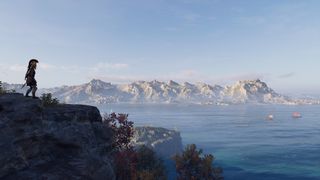
I’ve played 20 hours of Assassin’s Creed: Odyssey on PS4: PC code didn’t arrive in time for us to review this massive game in time for its embargo, so Steven will be publishing a full review of the PC version later this week. He'll also publish a review-in-progress later today. In the meantime, these are my impressions based on the console build thus far.
I’m playing as Kassandra, the daughter of Spartan army commander Nikolaos. She was exiled from the Spartans as a young girl and rescued by a small-time hustler on the island of Kephallonia. This is where Odyssey starts: Kassandra is now a woman and that small-time hustler, Markos, uses her as a go-between for his various dodgy money-making exploits. Markos is charming, but this being Assassin’s Creed Odyssey—a game that whole-heartedly embraces conversation trees—you can still treat him like an arsehole if you want. I am playing Assassin’s Creed Odyssey as a deadset arsehole, to the best of my capabilities. But whether I choose to be an arsehole to the slightly-dodgy guy who saved my life or not, Kassandra is still fated to play a crucial role in the Peloponnesian War.
So far, most of the conversation trees determine whether I want to be an arsehole, or whether I want to be a very nice person. The results can be bracing: one side-quest giver pressured me to get her some wood. I agreed to do so, prompting her to politely insist that it must be done quickly. Selecting the less-nice-sounding conversation prompt, Kassandra arced up and almost hit the poor old lady for her impatience. I was a bit shocked. I didn’t want to be that much of an arsehole. Ugh.
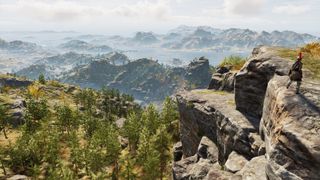
It’s worth dwelling on the conversation tree aspects of Odyssey, since it’s probably the biggest addition to this instalment. At least where side quests are concerned, I’m not yet sure whether the choices I make will have reverberating effects on the narrative. Later on in my playthrough, a Spartan soldier tasked me with investigating a raid on one of their provisions carts. I eventually found a family of impoverished locals, destitute due to the Spartan/Athenian conflict, holed up in a cave. It turns out they were responsible. So Kassandra starts talking and inevitably there are conversation choices. I was prompted with the option to fight these unarmed people, and I selected it, morbidly curious whether the game would have me murder them. And it bloody well did: the family attacked with their fists and I slayed them with my battle axe. A sole child was left weeping over his family's bloodied corpses. It’s very possible to be an arsehole in Assassin’s Creed Odyssey. I'm in way over my head.
Odyssey is a pretty randy game. I've slept with two (2) people already.
This is hardly the first time a game has let me be an arsehole via the careful selection of conversation prompts, but I was genuinely shocked by how that scenario went down. It’s far from morally grey (though Spartans might disagree), and I haven’t encountered anything so subtle and finely wrought as, say, the Baron quest in The Witcher 3. Still, later in the game, a character refused to help me because I’d murdered those people. I’ve heard from another writer that the same character refused them help too, but for a reason associated with a different side-quest I haven’t yet completed. I’m not sure whether there’s a way to have this character agree to help, but even if the consequences of all my actions don’t change the overall narrative arc, the story still adapts in minor yet intricate ways. I struggled to keep track of the narrative in Origins after the first 20 hours, but due to the way Odyssey reminds me of all the bad stuff that I've done, I'm currently wholly invested in Kassandra's tale.
On the other hand, in the realm of main story quests, it's very possible to murder crucial characters. This is seemingly only possibly during main quest set pieces— Divinity this ain't—but you will occasionally make choices that seem dizzyingly far-reaching.
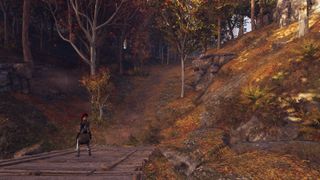
I came to Odyssey ambivalently: I played and loved Origins, but was wary of spending yet another 100 hours doing largely the same thing. For the first ten or so hours, I didn’t feel like Odyssey would offer anything sufficiently new to pique my interest. If I hadn’t played for yet another ten hours, this impressions piece would be far less positive. But I’m happy to report that Odyssey develops in fascinating ways, even while some might be disappointed by the return of level-gated main quests that force some dabbling in side activities.
The biggest gaming news, reviews and hardware deals
Keep up to date with the most important stories and the best deals, as picked by the PC Gamer team.
Still, it’s possible that a lot of the side-questing can be ignored in favour of Odyssey’s large-scale region conquering systems. These will be familiar to players of Ghost Recon: Wildlands and Far Cry 5. You’ll be aligned with the Spartans in the early game, working to diminish the influence of the Athenians in the region of Megaris. To chip away at the Athenians I needed to reduce their “Nation Power”, and this was achieved via a bunch of busywork like destroying war supplies, killing soldiers and pillaging their Nation Treasure. Once I’d whittled down the Athenians’ power meter there was a large scale infantry Conquest battle.
I didn’t enjoy whittling down the Athenians’ power meter. I dislike whittling down meters in general, and I feared the game would have me doing this for the vast majority of its duration. But once I’d seen this system through once, the game hasn’t forced me to do it since. I could be doing it—there are at least two Conquest battles to work towards on my map at the moment—but for all I can tell, these are just grandiose ways to get XP and loot. It’s possible that “grinding” between main quests can be achieved like this, rather than, for example, collecting a cow’s scrotum for a local woman’s aphrodisiac potion. Odyssey is a pretty randy game. I've slept with two people already. But my point is: there seems to be more freedom when it comes to how you'll gain the XP to tackle the next story quest.
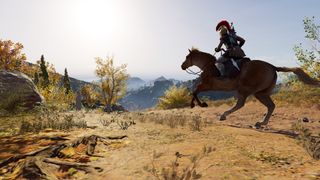
The scale of Odyssey is overwhelming. The map is huge, and substantial new activities are doled out at an alarming pace in the first 20 hours. Access is gained to a ship much earlier than in Origins, and the upgrade path for your vessel is staggering (Ubisoft really wants you to be playing this game for as long as it takes them to make a new one). It’s also possible to recruit NPCs to your crew, but I’m yet to discover whether any of this makes a difference in the longterm. The last thing I did before writing this article was learn about the Cult of Kosmos, which opens up a whole new sub-game focused on assassinating its 30 members. If you’re one to wring your hands about games being too big, this will be something entirely new to be upset about. This really feels like a new frontier, in terms of the amount of stuff there is to do in a single game.
Overall, and despite myself, I’m engrossed in Odyssey. Ten hours ago, I wanted to put it down for good. 20 hours in, and I'm hooked. The conversation trees don’t feel quite as subtle as Mass Effect 2, to name just one example, but they definitely help to establish the kind of Kassandra (or Alexios) you want to be. Whether the vast majority of these conversations prove to be superfluous or not, it’s a whole lot more engaging than watching a cutscene play out, and the game has thus far demonstrated a dedication to remembering what a complete arsehole I’ve chosen to be.
Crucially, Odyssey definitely feels more like an RPG than Origins did. You’ll still be infiltrating camps and historical buildings, you’ll still be tearing away at Dark Souls-lite combat, you’ll still be scaling a building rather than walking around it. But the game makes an effort to respond to your expression. For me at least, I’m ready to sink a significant portion of my life into this adventure. And trust me: I was reluctant.
Also, I love these cherubs:
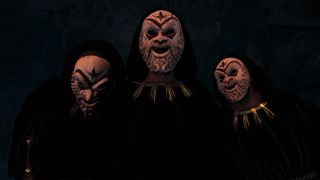
Shaun Prescott is the Australian editor of PC Gamer. With over ten years experience covering the games industry, his work has appeared on GamesRadar+, TechRadar, The Guardian, PLAY Magazine, the Sydney Morning Herald, and more. Specific interests include indie games, obscure Metroidvanias, speedrunning, experimental games and FPSs. He thinks Lulu by Metallica and Lou Reed is an all-time classic that will receive its due critical reappraisal one day.
Most Popular

